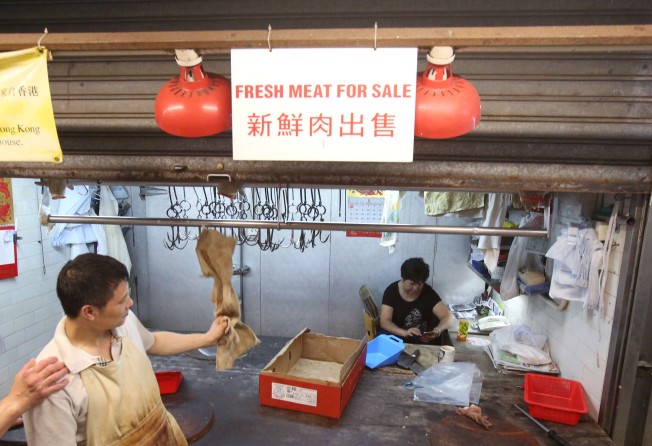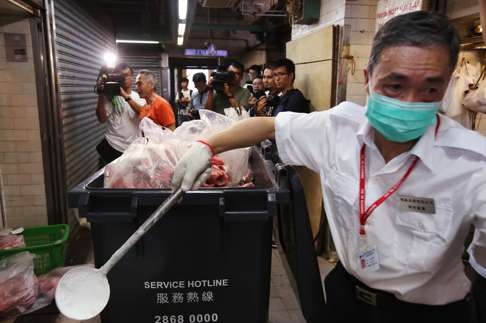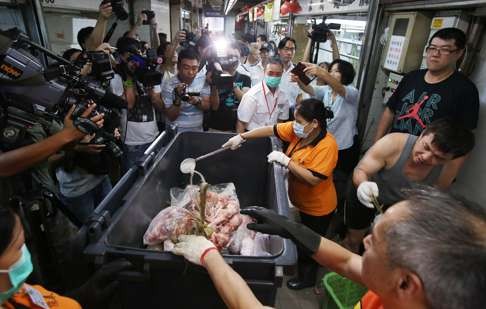Hong Kong tainted pork scandal: questions on inspection process still hog public attention
Hongkongers remain in the dark over how contaminated meat reached market, but investigation report out soon to shed some light

The recent failure of the government to stop contaminated pork from making its way to dinner tables has raised questions over whether the authorities are doing enough to ensure food safety.
On August 4, the Food and Environmental Hygiene Department (FEHD) discovered 319 pigs from Jiangxi province in south-east China had traces of salbutamol and clenbuterol. The prohibited drugs, used to treat asthma, also artificially enhance animal growth and leanness.
At least 40 pigs were found to have been sold to 27 retailers across the city when the problem came to light the next morning, but the public is still in the dark on the reasons behind the slip-up.
Health experts say consuming pork with high levels of the drug can lead to an increased heart rate, dizziness, headaches, trembling and nervousness. There have so far not been any reports of food poisoning and illnesses.

After a meeting between the government and pork trade representatives yesterday, Deputy Secretary for Food and Health Christopher Wong Kwok-bun said the government would ensure pigs are thoroughly tested before they are delivered to the market. The investigation report, to be released this week, will give more details on which parts of the procedure went wrong, and an explanation on compensation.

“Slaughtering will not start when the test results have not confirmed the pigs to be 100 per cent safe … this is the most basic protection,” Hui said.
It is understood that the new arrangement would start after the release of the report.
Slaughterhouse operator Ng Fung Hong has been lying low since the gaffe and refused to answer media inquiries, including those from the Post, on how the pork had reached the market.
The investigation will confirm if there are any loopholes in the current inspection and reporting system, whether procedural guidelines are clear enough, and if any personnel had failed to adhere to them, according to Ko.
The quality assurance of imported pigs is paramount, considering it accounts for 94 per cent of Hong Kong’s total pork consumption. The pigs are sourced from more than 200 registered farms in mainland China and city authorities conduct frequent visits and checks on the farms every year.
Thorough inspection
Under standard procedure, the 4,000 pigs that arrive in Hong Kong every day are inspected three times for various health diseases before they are delivered to meat vendors for sale.
The pigs, transported via 100 lorries from 10 different provinces, are stopped at an inspection station before they can enter the city. FEHD inspectors are in charge of collecting and verifying animal health certificates issued by China’s quarantine bureau, checking against each pig’s batch number and origin code tattooed on its ears.
Until now, there has been no answer from the government on why the tainted pigs were allowed to enter the city in the first place.
The Entry-Exit Inspection and Quarantine Bureau of the People’s Republic of China, which issues the certificates, could not be reached for comment. The bureau has since banned all farms in Jiangxi from supplying pigs to Hong Kong until further notice.
On reaching the slaughterhouse, urine samples are then collected from each batch of pigs to test for seven prohibited chemicals and drugs, including the ones detected early this month.
The pigs are later auctioned to registered middle agents while test results are being processed.
The test, which takes around four hours at a government lab, are usually ready before 10pm.
Contradictory reports
The government claims the pigs are slaughtered only when there is confirmation they have passed the tests, but this is where contradictory reports have surfaced.
According to the Hong Kong Agriculture Special Zone, which is one of three pig suppliers, various buying agents and pork vendors, slaughterhouse operators are notified by FEHD officials only if there are problems with the test results.
“Once the clock strikes 12am, the pigs are slaughtered if there is no notification from [FEHD officials],” Hui said.
The government said the Agriculture, Fisheries and Conservation Department on August 4 sent out preliminary reports of the results – which tested positive for the drugs – at 10pm.
But Kwan Kwok-wa, a registered middle agent, citing information from insiders, said the report came only at 1.30am, which would mean some pigs had already been slaughtered.
Cheng Ka-shing, managing director at the Hong Kong Agriculture Special Zone, said that usually by 10pm, a FEHD official puts a notice on a bulletin board to specify which batch of pigs have failed the doping tests and need to be isolated. If no notice is put up, the slaughterhouse staff will assume that the test results are clear.
Cheng, who has worked in the industry for more than 30 years, said he believes that a notice was not put up that evening. “The staff must not have received any orders to lock up the pig pens in time, otherwise this wouldn’t have happened,” Cheng told the Post.
A faulty system or man-made error?
Kwan, also the vice-chairman of Hong Kong Fresh Meat United – a group which represents middle agents and vendors – had earlier suggested postponing the auction and slaughter of the pigs to a day after they arrive and until all inspection results are approved. He had said it was the only viable method to ensure pork is safe for consumption and to restore the public’s confidence.
“It would be impossible for any mistakes to happen if the authorities have 24 hours to conduct [the test] and confirm the results,” he had said, adding that this was the procedure used in the industry up until 2007.
Current agriculture lawmaker Steven Ho Chun-yin also backed his suggestion.
However, Wong Yun-kan, former lawmaker of the agriculture and fisheries sector, said the proposal is “unreasonable”.
“The [current] operation system had not made any mistakes since 2007. This time, officers from the [FEHD] should be the ones at fault,” Wong said.
He added that the proposal meant extra people would need to be hired to take care of the pigs overnight. “The increased operation cost would finally be borne by the public,” he said.
Wong and Ho are both running for the Agriculture and Fisheries constituency seat in the Legislative Council election.
Cheng Ka-shingalso said the proposal would not be suitable. “It would not be healthy for the pigs to be kept in such cramped conditions overnight,” he said.
“This system has been in place for the past nine years and it has worked just fine. Why should the system be changed for something that is clearly the government’s mistake?”
For a full list of candidates, see http://multimedia.scmp.com/legcocandidates/


